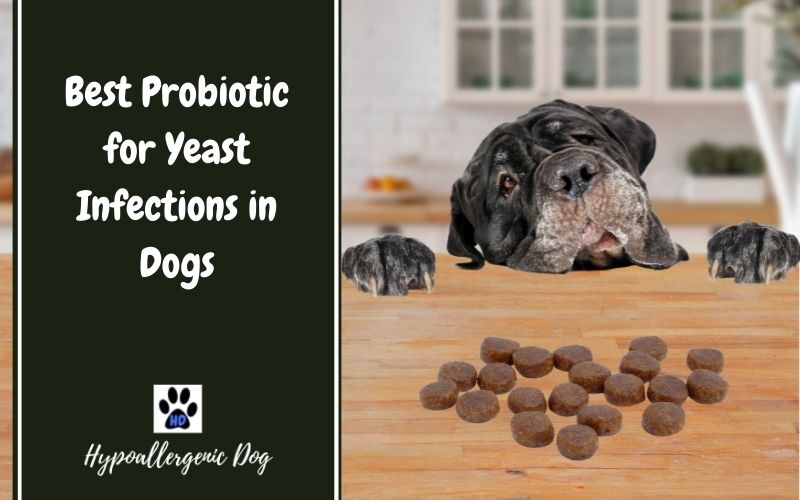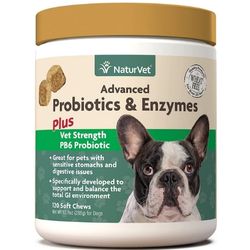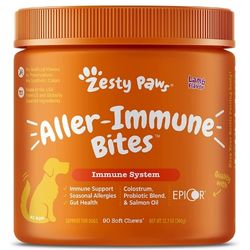Best Probiotic for Yeast Infections in Dogs — Buyers Guide, Review, and Comparison
Top Probiotic for Dog Yeast Infection Comparison Table
Best Probiotic for Yeast Infections in Dog Buying Guide
What Is a Yeast Infection in Dogs?
Yeast Infections in Dogs — The Symptom
Benefits of Probiotics for Dogs With Yeast Problem
What to Look For in Dog Probiotics for Yeast Infection
TOP RECOMMENDED DOG PROBIOTIC FOR YEAST INFECTIONS
NaturVet – Advanced Probiotics & Enzymes
Containing probiotic strains Bacillus Subtilis, Bacillus Coagulans, and other enzymes, Naturvet has developed this amazing soft chew for our furry friends. Using high-quality ingredients, it’s wheat-free, made in the USA, and third-party tested for purity.
- Protects against most allergies, not just yeast.
- Suitable from 6 weeks old.
- Developed by vets.
Skin infections in dogs are one of the most common ailments vets diagnose. Our cute canines are rough, rugged, and ready to play. But on the other hand, they also have their own sensitivities to contend with! Of course, you can treat the infections time after time but it may just leave you with a very large bill and a poorly pooch. The best probiotic for yeast infections in dogs can boost your canine’s immune system to fight them.
Image
Product
Details
Count: 120
Flavor: Not disclosed
Form: Soft chew
Age Range: 6 weeks+
One billion CFUs — bacillus subtilis.
Designed for complete GI development.
Wheat-free.
Product Rating: 4.7/5
Count: 90
Flavor: Lamb, Peanut Butter & Salmon
Form: Soft chew
Age Range: All ages
Grain, soy & corn-free.
Includes omega-3s.
Easy to administer.
Product Rating: 4.3/5
Count: 60
Flavor: Meat
Form: Soft chew
Age Range: All ages
Bite-size.
Good value.
Contain PB6 probiotics.
Product Rating: 4.6/5
Count: 30
Flavor: Pork
Item Form: Soft chew
Age Range: All ages
Tasty treat.
Fast acting.
Convenient to put with or without food.
Product Rating: 4.2/5
Count: 120 (scoops)
Flavor: Tasteless
Item Form: Powder
Age Range: All ages
Easy to use with food.
Fast acting.
Handy scoop included.
Product Rating: 4.1/5
Yeast infections in dogs, whether in their ears or their skin, is usually a result of another underlying condition. This could be from a food allergy, hormonal imbalance, or other immune issues.
If you’re searching for the best probiotic for yeast infections in dogs, there are a few key things that you need to look out for. These will help ensure that you’re getting the right product for your pooch.
As we said above, yeast infections are usually a result of something else going on with your dog’s health. But depending on whether your dog has an ear or skin yeast infection can help you determine the underlying cause.
For a skin yeast infection, the causes could be:
- Allergies — food or environmental.
- Immunity issues.
- Antibiotics.
While for a dog yeast ear infection, the triggers include:
- Bacteria.
- Trapped water in the ear canal.
- Breed of dog — certain dogs are more prone to yeast infections. For example, canines with floppy ears.
It’s normal for your dog to have yeast on their skin and in their ears, but it’s in minimal amounts, which doesn’t cause any issues. When the yeast rapidly increases its numbers is when the problems start.
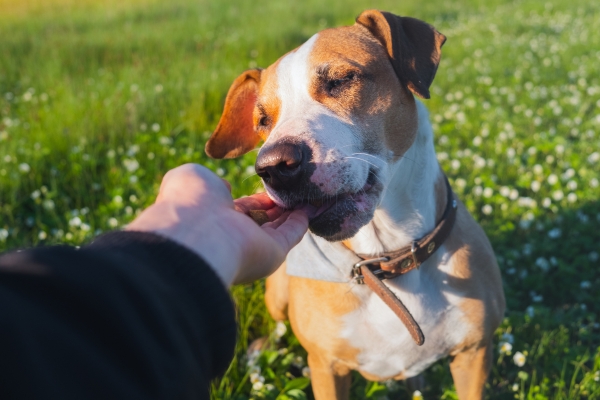
Skin Yeast Infections
- Constant chewing, biting, scratching, and licking of the skin.
- Raw spots may bleed or become sore.
- Dandruff.
- Greasy coat.
- Infected areas may become smelly.
- Crusty, swollen patches of skin.
- Lack of appetite.
- Depressed.
- Lethargic.
- Aggressive behavior.
Ear Yeast Infections
- Head shaking.
- A foul odor.
- Brown discharge.
- Rubbing of ears.
- Constant ear scratching.
To learn more, read our guide on Dog Yeast Infections.
If you find that your dog is prone to these flare-ups, your vet can prescribe various topical anti-yeast ointments, shampoos, sprays, or powders.
However, once your pooch has been subjected to such an infection, there is a high chance it will return.
So, if you feel like you’re visiting the vet more often than not with the same issues, they may suggest a preventative approach. This could include, looking at your dog’s diet and/or using a probiotic supplement to help your dog’s immune system before the infection takes hold.
Dog probiotics for yeast issues can help balance the immune system so that your dog’s body can get back to full health.
Using a probiotic in your pal’s routine means that they can stay healthy and not become agitated when undesirable symptoms appear. These probiotics can help dogs with yeast infections by producing short-chain fatty acids in the digestive tract. These fatty acids can stop harmful bacteria build-up from developing into a yeast infection.
Using probiotics for yeast in dogs can not only help manage yeast but also:
- Support your furry friend’s entire immune system.
- Relieve anxiety and stress.
- Alleviate food allergies.
- Improve their mood.
If you’re looking for the best dog probiotic for yeast infection, there are things that you’ll need to take into consideration before making that final choice.
Probiotic Form
Probiotics for dogs with yeast infection come in a range of different forms — from chews, powders, and tablets. What works for one dog won’t necessarily work for another. If your dog is fussy, a powder you can mix into their food may be the most appropriate choice. While if you have a dog that loves treats, a chew form may be the best. But, you’ll have to ensure your pooch likes the taste.
Canine-Specific Probiotic Species
It may be tempting to give your dog your own probiotic, but this may cause more problems than it will solve. Dog-specific probiotics are geared towards dog-friendly, friendly bacteria. In that, they will contain the correct strains of bacteria beneficial to your dog’s health. So, don’t get caught up in buying a human probiotic.
CFU Quantity
When looking through probiotics, you’ll notice the abbreviation CFU pops up quite a bit. Colony-Forming Units basically mean the number of friendly bacteria within the supplement. So, technically, the higher the count, the stronger the product is. Admittedly, this may not always mean it’s the best, but when comparing, it will give you a good indication of potency. Sometimes, starting off with a lower count and working up alleviates the chances of side effects, like soft stools.
Naturvet has developed this amazing probiotic for our furry friends, which comes in either powder or chew form.
This is our best probiotics for dogs with yeast infection — it contains 1 billion Bacillus PB6 probiotic strains — an extensively researched and patented friendly bacteria — and 100 million CFUs of Bacillus Coagulans. They help to restore your dog’s gut balance and immune response.
With a wheat-free combination, it’s also suitable for Fidos with food intolerances. Plus, it includes enzymes that help dogs break down and fully utilize the vitamins and minerals in their food.
What’s more, NaturVet is made in the USA and also formulated by vets.
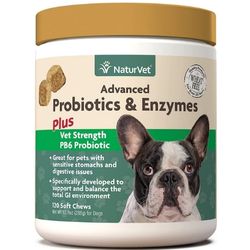
Pros
- Made in the USA
- Suitable for dogs with allergies.
- Available in both powder and chews.
Cons
- Some dogs experienced softer stools.
- Not great for a fussy pet.
If your dog is a frequent sufferer of yeast infections because of allergies, this Zesty Paws dog yeast probiotic could be worth a look.
In the form of small bite-size chews, each serving provides 250 million CFUs of a five-strain probiotic blend, which is perfect for balancing gut health. It also includes a patented form of yeast — Epicor — to boost immunity, which in turn helps improve the symptoms of skin allergies, yeast infections in both ears and skin, digestive issues, and seasonal allergies.
These chews have a lamb flavoring, which makes them an appealing option to give to your pet. They’re also packed with omega 3 — in the form of salmon oil — to support skin health in your furry friend.
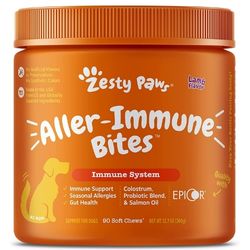
Pros
- Flavored — easy to administer.
- Grain, soy, and corn-free.
- Suitable for all ages.
Cons
- Contains palm oil.
- Takes time to work.
These probiotic chews for dogs with yeast infection are designed to support your dog’s complete system — from gut function to providing a balanced digestive system.
Not only are these chews formulated by vets, but they also contain 1 billion CFUs of Bacillus PB6 probiotics and 100 million CFUs of Bacillus Coagulans. Other ingredients include a mix of prebiotics that feed the friendly bacteria for better results, and enzymes that encourage the absorption of nutrients — so your dog gets the most out of every meal.
Healthy Solutions probiotics for dogs with yeast infections are suitable for canines of all ages and can be a useful supplement when weaning puppies or transitioning between two foods. They’re manufactured in the USA and are FDA approved.
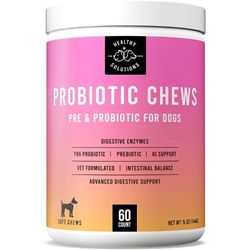
Pros
- Bite-size.
- Available in 60 and 120 count.
- Non-wheat product.
Cons
- Chews could be softer.
- Taste doesn’t receive a unanimous thumbs up.
Petlab probiotics for yeast infection include a blend of eight probiotics containing a total of 3 billion CFUs per serving, as well as natural digestive enzymes. Plus, prebiotics of pumpkin and inulin are included for an all round gut-health boost.
These probiotic chews not only help support your dog’s digestive system but also contain bacteria that are hugely beneficial to healthy yeast levels. Ensuring that those ears, whether floppy or pointy, are yeast-infection-free and your dog is comfortable.
Petlab also prides itself on the fact these chews are made in the USA, and their development has been in conjunction with feedback from dog lovers and owners.
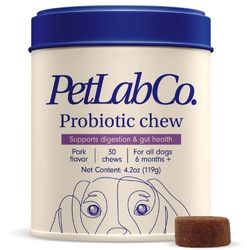
Pros
- Fast acting.
- Suitable for all breeds.
- Made in the USA.
Cons
- Proprietary blend.
- Large chews for small dogs.
If your pooch is smart but stubborn and point-blank refuses to eat the chews, NuLife probiotic powder could be the solution.
This probiotic is both tasteless and completely odorless, which means you can easily mix it into their food without them noticing. So whether you’re looking for probiotics for dog ear infections or skin yeast infections, you’re good to go.
An all-natural formula — including a blend of four probiotics containing 20 billion CFUs per serving, plus prebiotics and enzymes as well as over 70 essential minerals. It’s a well-rounded supplement for boosting digestive health to combat yeast infections.
NuLife probiotic formula is grain-free, dairy-free, GMO-free, and contains no wheat, soy, or fillers, so it’s suitable for all dogs, even those that may have allergies.
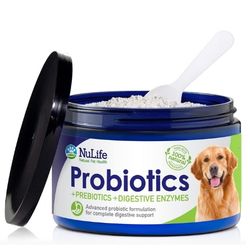
Pros
- Easy to add to food.
- Fast acting.
- Handy scoop included.
Cons
- Dosage directions could be clearer.
- Only available in small 4-ounce containers.
Conclusion
Dog probiotics certainly give you food for thought on what you can give your best friend to aid their natural healthy immune systems. Thus helping to prevent or reduce the likelihood of yeast infections occurring.
In your search for the best probiotics for yeast infections in dogs, there are some factors to think about before making your final choice. Don’t forget to consider the form of the probiotic chew, powder, or tablet; the CFU count, and that it contains beneficial bacteria for dogs, not humans.
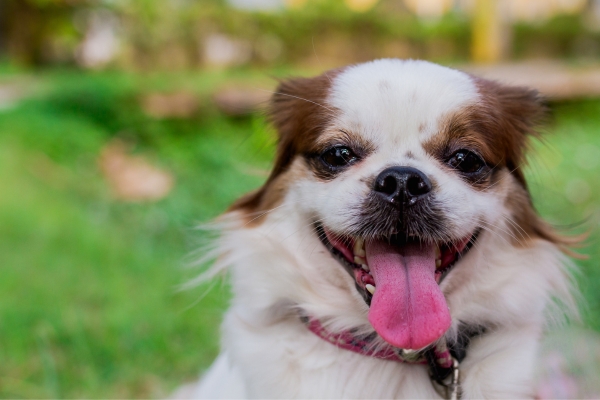
Best Probiotics for Dogs With Yeast Infections FAQs
Do Probiotics Help With Yeast in Dogs Ears?
Yeast infections are quite common in our furry friends. It can spread quite rapidly and attacks their paws and ears the most. Using therapeutic probiotics for dogs yeast in ears can help to restore the balance of good bacteria in the gut and help to regain normal Ph levels in the body.
How Do You Get Rid of Yeast in a Dog’s Ear?
If you suspect a yeast infection, always get your dog checked by a vet. However, if this infection is recurring, you can try remedies at home before heading for medication. Regular ear cleaning can help especially if it contains Ketoconazole — an antifungal medication.
What Foods Cause Yeast Infections in Dog’s Ears?
Common causes of yeast infections in a dog’s ears can be from their diet, feeding them excess grain or sugar can also contribute. Sugar feeds the yeast already in the body and causes an overgrowth, which in turn allows a build-up of yeast.
How Long Does It Take for Probiotics to Work in Dogs?
Once you start giving your dog probiotics regularly, you should expect to see improvements within 4 weeks of use. It could be that their symptoms come and go while their body is naturally adjusting to the nutrients.
Do Probiotics Help Dogs with Yeast Infections?
Probiotics for dogs with yeast infection in ears or skin can be of huge benefit. They not only help to clear up the infection, but can also help to improve your dog’s general health.
How Do You Get Rid of a Yeast Infection in a Dog’s Ear Naturally?
If you aren’t a fan of medications and prefer a natural route, apple cider vinegar can change the pH of your dog’s skin. This helps as the infection cannot grow if it’s applied regularly. A solution of half apple cider vinegar and half water can be used to bathe your dog or wipe the infected areas — but be prepared for the odor!
What Are the Best Probiotic Supplements for Yeast Infection in Dogs?
The best probiotics for yeast infections include Bacillus Coagulans or Bacillus Subtilis — they’re spore-forming and more likely to survive the journey through your dog’s gut.

